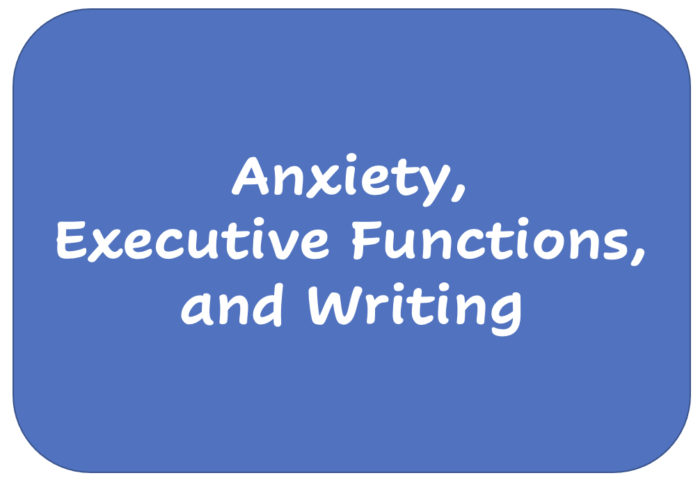Anxiety, Executive Functions, and Writing

This is a guest post written by Noel Foy, a Keys to Literacy trainer/consultant who specializes in how anxiety and executive functions affect learning. In this post, she addresses how this is related to student writing.
Do your students find it challenging to get started on a writing task? Do they have difficulty with stamina, effort and self-regulation or find it hard to remember the directions/steps of an assignment? If so, anxiety and underdeveloped executive function may be interfering with their productivity and motivation.
For students with executive functioning deficits, writing tasks can feel daunting, which can amp up their anxiety. Writing requires students to produce their thoughts on paper and to do so, they need to cue and coordinate their executive function. This includes a wide range of skills such as:
- goal setting
- task initiation
- planning
- organizing
- following through with multi-steps
- self-regulating one’s thoughts and behavior
- self-monitoring how the process is going
- putting forth the effort needed to complete the task
When you consider how essential the above skills are to starting and completing academic and writing tasks, it’s no surprise that kids with weak executive function often feel frustrated or overwhelmed.
The role of stress/anxiety as related to writing
When highly stressed or anxious, the stress response activates and executive function goes off line, hijacking the “thinking brain.” What may look like a reluctant or uncooperative student may actually be the stress response doing its job, resulting in kids acting or zoning out.
When faced with a writing task, you may notice your students exhibit behaviors such as:
- Fight mode—crumble up work and throw it across the room
- Flight mode—ask to go to nurse once a writing assignment is announced or anticipated
- Freeze mode—play dead (put one’s head down on desk) or appear frozen (deer in the headlights stare)
As Jessica Minahan states, “Behavior is communication.” Students might avoid writing tasks because they’re embarrassed about their skill deficits, fear making a mistake or have experienced previous failures with writing. Anxiety about the task can trigger negative self-talk such as, “I’m not good at writing or I’m stuck…I may as well quit.” In the absence of a “how to” mental blueprint or productive self-talk, students can quickly unravel and demonstrate a sense of “learned helplessness.”
What can teachers do?
Student avoidance and reluctance may stem from a lack of proficiency with writing in addition to gaps in executive function, metacognitive self-talk, self-regulation and/or productive responses to stress/anxiety, among other factors.
So, it is essential for teachers to being by asking: How can my lesson design help kids keep their thinking brain in charge? Where are the gaps and what support is needed?
Helping students decrease anxiety and build executive function isn’t something done a once a week or periodically. As Kathleen Kryza says, “Executive function needs to live in the classroom.”
Where can you start?
- Incorporate more of what the brain likes in your lesson by providing:
- choice of topic or task
- relevant, authentic, or novel topics and audiences
- multi-sensory experiences (i.e. act out the writing process with movement, provide visuals with directions/steps and have students repeat them back)
- collaboration at every stage of the writing process
- The above boost dopamine and engagement, which enhance mood, behavior and motivation.
- Reduce cognitive overload by:
- breaking assignments into chunks
- providing sentence starters/frames, templates, models of finished product (see examples in Keys to Content Writing)
- The above make challenges more achievable, help students get started and rebuild a picture in their mind (mental schema) of the task’s parts.
- Reinforce “meta language” by cuing kids at each stage of the writing task with questions such as:
- Before: What am I learning? What do I need to get ready and where will I work? What’s my plan? Who will I ask for help, if needed?
- During: How’s the process going? What’s going well? What needs more work?
- After: Where do I turn in/submit my work? Did I reach my goal-why/why not? What’s something I learned from this assignment or about myself?
- The above type of questions and language can be practiced via Quick Writes, Do Now’s or Pair Shares. They help build metacognition, boost working memory, get students doing more of the thinking/doing and shift the locus of control from feeling helpless to having a plan.
- Learn productive responses to stress/anxiety
- Quick Resets (i.e. slow deep breathing or some type of movement or mindfulness practice)
- ABC Strategy from ABC Worry Free: this 3-step approach validates how students feel, cues their nervous system to “pump the brakes” and helps them reframe how they think about the task. Here are examples applied to writing.
A=Accept The writing process is long and challenging.
B=Breathe Do slow, deep breathing to calm the brain and body.
C=Change my thinking (turn a threat into an opportunity, action step or new perspective)
Writing isn’t quick and easy—I’ll take it one step at a time and celebrate “wins” as I go.
A=Accept I don’t know how to get started.
B=Breathe Do slow, deep breathing to reset.
C=Change my thinking (turn a threat into opportunity or new way of thinking)
I have a plan: I’ll look at the samples for ideas, complete the sentence frame and ask for help, if needed.
These applications can be posted around the classroom and referenced regularly so students don’t feel alone in their writing struggles and can be reminded that there’s something productive they can do when they feel stressed.
- Do Skill building writing activities/strategies (see examples from Keys to Writing)
Resources:
Research-Based Strategies to Ignite Student Learning: Insights from Neuroscience and the Classroom
By Judy Willis and Malana Willis
Handbook of Executive Functioning, Editors Sam Goldstein and Jack A. Naglieri
The Behavior Code Companion by Jessica Minahan:
About Noel Foy
An award-winning author, Noel is the founder of Neuro Noel Consulting. She specializes in workshops and one-on-one coaching for children and adults in anxiety/stress management, executive function, growth mindset and simple ways to use Neuroscience findings to their advantage. Noel’s books (ABC Worry Free, Are You a Bird Like Me?) are inspired by her desire to engage readers in fun, playful and empowering stories that provide practical problem-solving tools to decrease stress, promote healthy change and maximize one’s potential. Contact Noel at Neuro Noel Consulting Her books are available on Amazon: Are You A Bird Like Me? ABC Worry Free

 Joan Sedita is the founder of Keys to Literacy and author of the Keys to Literacy professional development programs. She is an experienced educator, nationally recognized speaker and teacher trainer. She has worked for over 35 years in the literacy education field and has presented to thousands of teachers and related professionals at schools, colleges, clinics, and professional conferences.
Joan Sedita is the founder of Keys to Literacy and author of the Keys to Literacy professional development programs. She is an experienced educator, nationally recognized speaker and teacher trainer. She has worked for over 35 years in the literacy education field and has presented to thousands of teachers and related professionals at schools, colleges, clinics, and professional conferences.
Anxiety is rampant nowadays, and it was a great and helpful piece that we can take the time to read and learn with. Thank you, and I appreciate you sharing this informative piece.
It’s clear that anxiety, executive functions, and writing are all connected. Anxiety can interfere with executive functions and make it difficult to focus on writing tasks, while executive functions are necessary for successful writing. It’s important to recognize how these three factors can influence each other and to use strategies to help manage anxiety and executive functions to enhance writing performance.